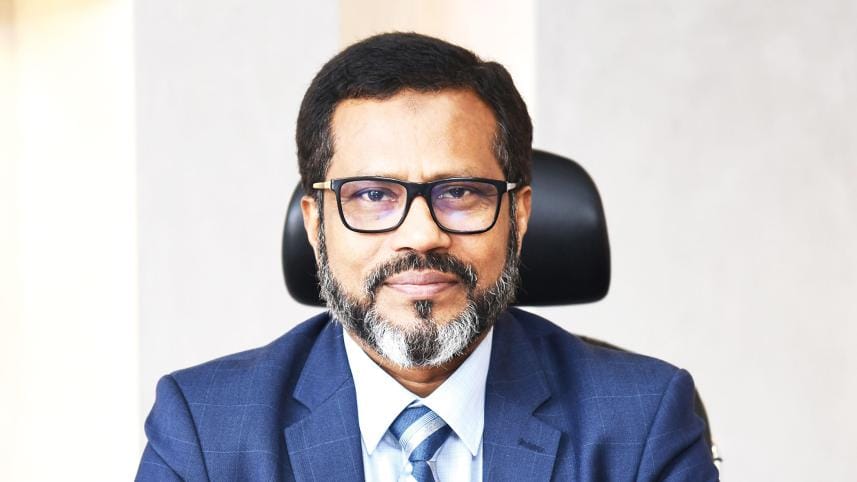Building a future on inclusion and gender equity

Mohammad Mamdudur Rashid
Managing Director & CEO, United Commercial Bank (UCB)
The Daily Star (TDS): How would you assess the current state of sustainable banking in Bangladesh?
Mohammad Mamdudur Rashid (MMR): Sustainable and green banking in Bangladesh has made noteworthy progress over the past decade, largely driven by the proactive leadership of Bangladesh Bank. The central bank has instituted clear regulatory guidelines and disbursement targets that mandate banks to allocate funds specifically for green finance and incorporate Environmental and Social Risk Management (ESRM) into their lending processes. This regulatory framework has transformed sustainable finance from a voluntary initiative into a core component of the banking sector's operations.
However, the sector is still in a transitional phase. While most banks are keen on meeting compliance obligations, the volume of sustainable financing remains modest relative to the vast investment needs of the country. Bangladesh is particularly vulnerable to climate change and natural disasters, necessitating large-scale investments in renewable energy, climate-resilient infrastructure, sustainable agriculture, and adaptation initiatives. Although the building blocks — regulatory support, growing awareness, and emerging demand — are firmly in place, scaling up innovative financing solutions remains a critical challenge. We still have some way to go before sustainable banking becomes a central pillar driving economic growth and climate resilience.
TDS: What sustainable financing/refinancing schemes does UCB offer, particularly for SMEs, women entrepreneurs, or other environmentally responsible enterprises?
MMR: At UCB, our sustainable finance strategy is closely aligned with Bangladesh's national development priorities and global sustainability goals. We currently provide a range of green financing options covering renewable energy projects, energy efficiency improvements, green buildings, sustainable transport initiatives, and waste management solutions — both solid and liquid.
Recognising the pivotal role SMEs play in driving economic resilience, especially in rural and semi-urban areas, we have tailored specific financing programmes for small and medium enterprises engaged in sustainable business practices. These are complemented by refinancing schemes supported by Bangladesh Bank to improve affordability and ease of access.
Furthermore, we are committed to promoting financial inclusion and gender equity. UCB offers dedicated financing opportunities for women entrepreneurs involved in green and circular economy ventures. This ensures that sustainable development benefits are widely shared across various segments of society.
To facilitate client engagement and advisory support, UCB has established 50 Sustainable Finance Help Desks strategically located in key branches across the country. These desks are managed by a dedicated Sustainable Finance Unit that assists clients in navigating green finance options, securing refinancing facilities, and structuring environmentally responsible projects. This proactive outreach embeds sustainability into both our corporate and retail lending portfolios.
TDS: What initiatives has UCB undertaken to promote sustainable banking internally, and what measures have been implemented to reduce your own carbon footprint?
MMR: Our commitment to sustainability is woven into our governance and operational fabric. Environmental and social considerations are mandatory in all credit assessments through the integration of the Environmental and Social Due Diligence (ESDD) checklist into our risk management framework. This process involves ESG screening, environmental categorisation of projects, adherence to exclusion lists, and ongoing monitoring to ensure responsible lending.
Externally, we actively engage with clients to build capacities in sustainable business practices. Our Sustainable Finance Unit, supported by the branch help desks, conducts regular awareness sessions and provides hands-on guidance on identifying green opportunities.
On our operational front, UCB has implemented a suite of sustainability measures. We have rolled out energy-efficient technologies within our office premises and promoted digital banking to significantly reduce paper consumption.
TDS: What challenges has UCB encountered in adopting and promoting sustainable banking practices?
MMR: Several challenges have emerged as we strive to expand sustainable banking. The most pressing issue remains the scarcity of long-term local currency financing options suitable for high-capital green projects such as large-scale renewable energy installations and resilient infrastructure. These projects typically demand extended repayment tenors, but most banks operate with relatively short-term funding structures, creating a mismatch.
Additionally, the perception of higher upfront costs and technology risks deters many potential borrowers, even though the long-term economic and environmental benefits are substantial. Another hurdle lies in the limited technical expertise available among both banks and clients to develop bankable green projects and carry out thorough ESG assessments.
TDS: What are UCB's future plans to advance sustainable banking, and what support do you seek from the government?
MMR: Looking ahead, our vision is to transform sustainable finance from a compliance requirement into a catalyst for innovation, growth, and competitive differentiation. Our strategic priorities include:
- Significantly scaling up financing for renewable energy projects, including utility-scale solar and other clean technologies.
- Expanding SME-focused green lending, especially in sectors aligned with circular economy principles such as recycling, organic farming, and sustainable textiles.
- Introducing innovative financial instruments such as green bonds and sustainability-linked loans that incentivise positive ESG outcomes.
- Harnessing digital technologies like artificial intelligence and blockchain to improve transparency, track ESG performance, and support standardised reporting against Sustainable Development Goals (SDGs).



 For all latest news, follow The Daily Star's Google News channel.
For all latest news, follow The Daily Star's Google News channel.
Comments